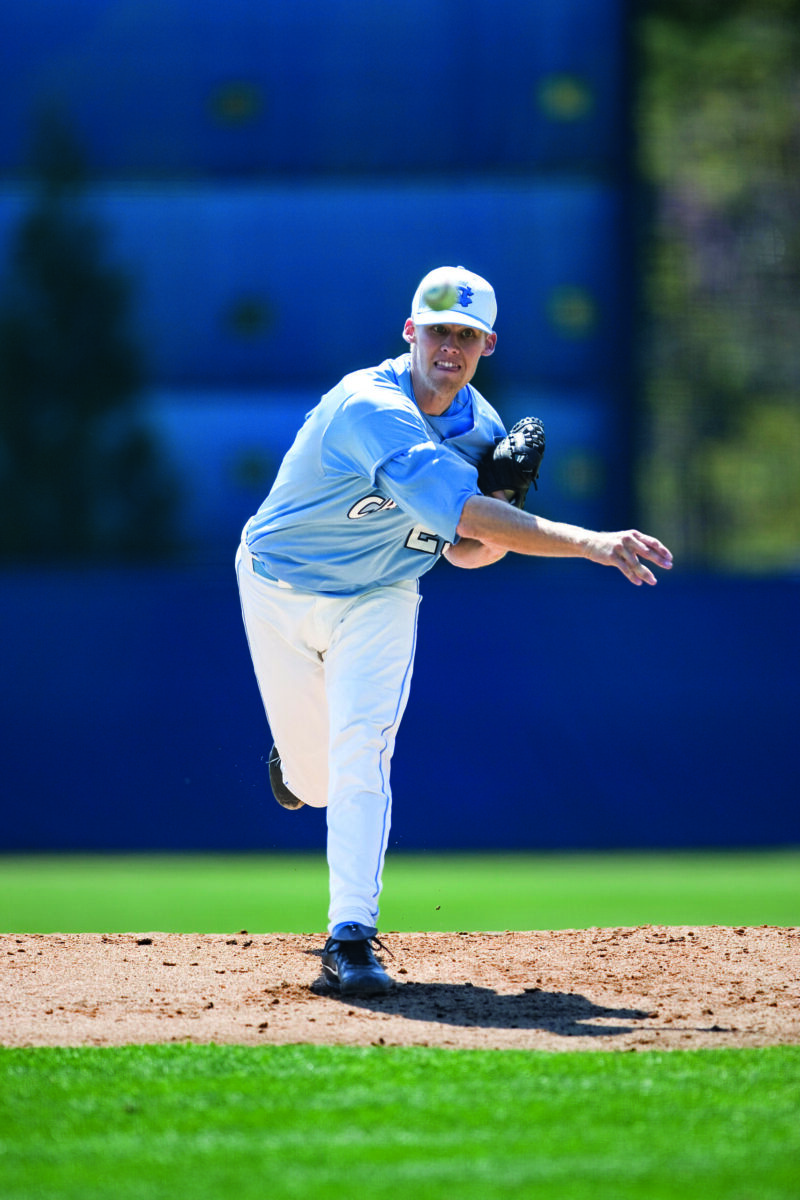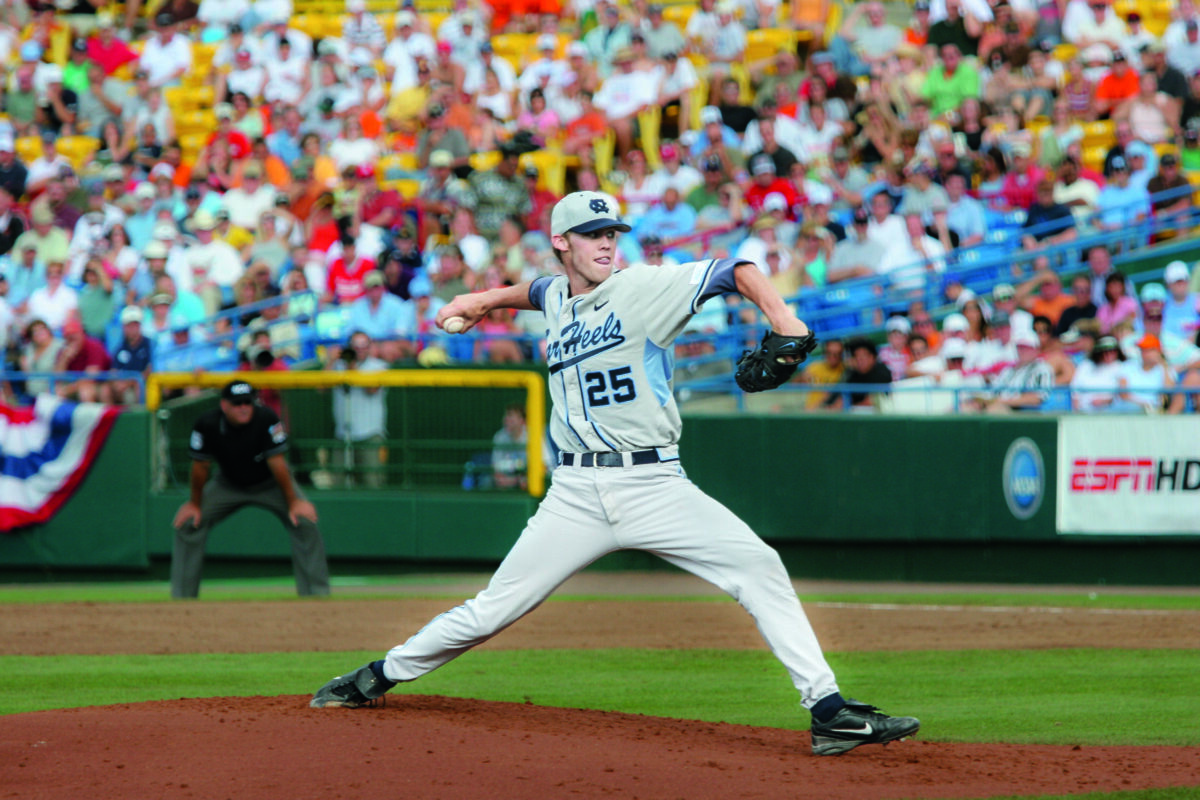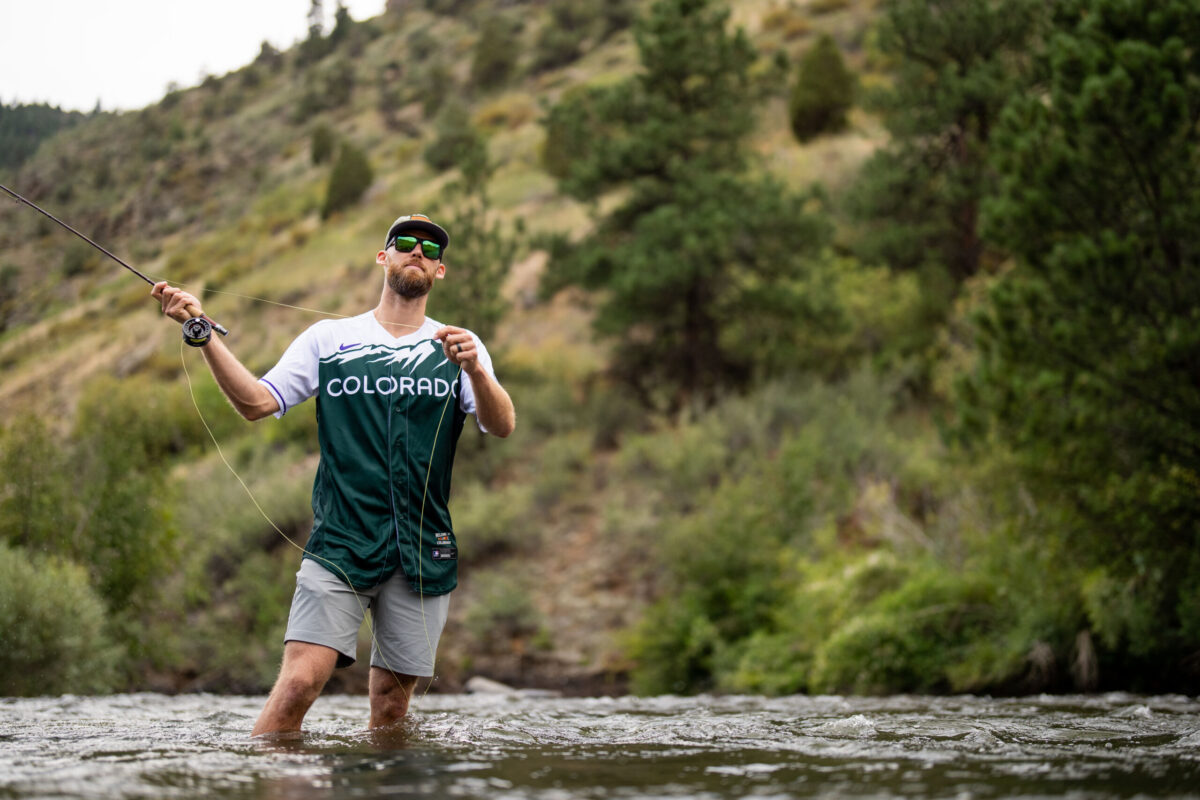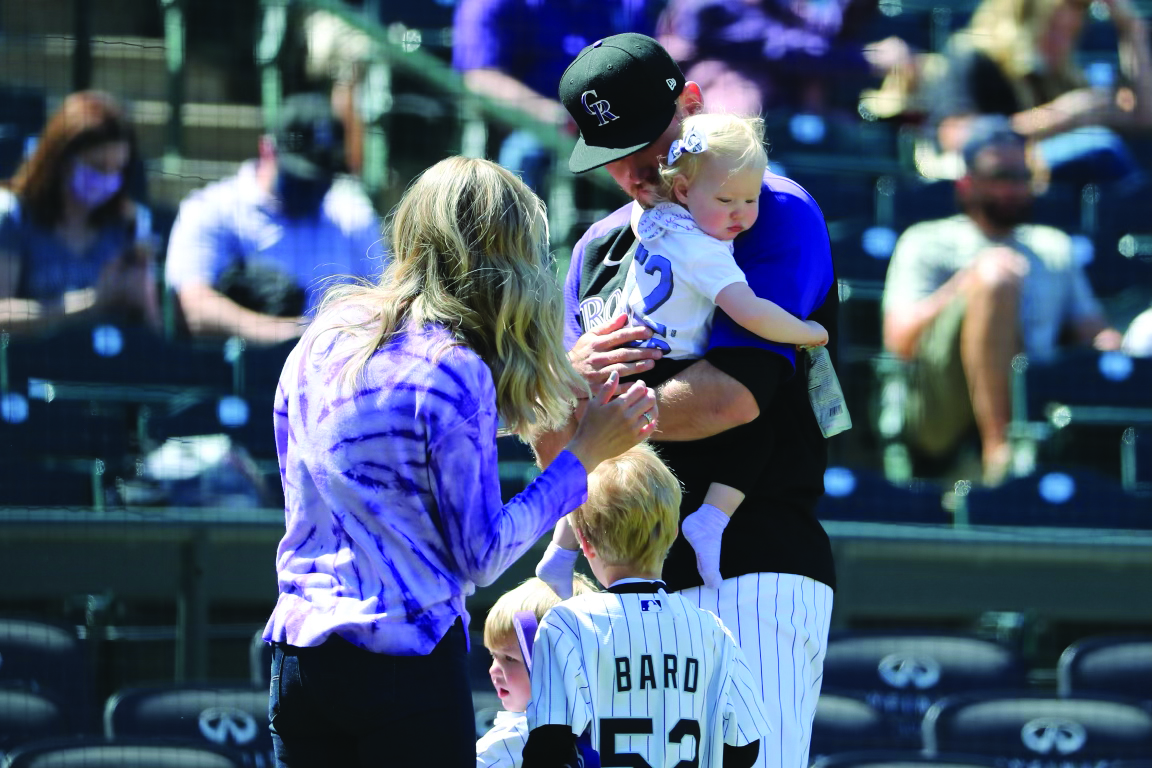Relief, Pitcher

Daniel Bard ’07, who had been one of UNC’s most dominant pitchers, suddenly lost his ability to throw — and seemingly, his major league career. He didn’t make a comeback until he learned to accept who he is.
by Anna Katherine Clemmons
In January 2017, almost 11 years after he’d last pitched for the Tar Heels, Daniel Bard ’07 stood on the mound inside Boshamer Stadium.
In 2006, Bard was a junior at UNC, pitching in what would be his final collegiate season. As one of the best starting college pitchers in the country, he finished the regular season at 8–3 with a 3.47 ERA. His final start in Chapel Hill was a 14–2 victory in the NCAA Regionals, advancing UNC toward what would be the finals of the College World Series.
A decade later, as he looked out on Bryson Field at Boshamer, Bard’s baseball life had crumbled. Drafted in the first round in 2006, he made his major league debut three years later. For two seasons, he was one of the most dominant young pitchers in the MLB. Then, it fell apart. Bard’s pitches became erratic and wild and were rarely over the plate — a phenomenon often referred to in sports vernacular as the “yips,” when a player suddenly has the inability to execute what was once routine, such as throwing or hitting a ball accurately.
Bard had tried numerous solutions. None had worked. So before he headed to minor league spring training with the St. Louis Cardinals in 2017 — his fifth major league organization in four years — he asked then-UNC head coach Mike Fox ’78 (’79 MAT) whether he could scrimmage with the Tar Heels.
“I think he had been given advice to go back to a place where you felt comfortable and had joy for the game,” Fox said. The veteran coach watched Bard, then 32, attempt sidearm pitches — a style he’d never utilized at UNC — grasping at any pitch or motion that might propel the ball over the plate. “It was hard to watch,” Fox said. “You could just see the pain.”
Bard felt that pain. And he wasn’t sure that he’d find his way out.
But he also wasn’t ready to stop trying.
“A special arm”
Bard grew up the oldest of three brothers in Charlotte. His father, Paul, played catcher for several minor league seasons, advancing as high as Double-A, two steps away from the major leagues. At 25, he retired from baseball, and he and his wife, Kathy, moved to Charlotte.

During his freshman season at Carolina in 2004, Bard was one of the nation’s best pitchers. His list of accolades was extensive. (Photo: UNC Athletics)
Paul wanted their three sons — Daniel, Jared ’10 and Luke — to experience multiple sports such as football, basketball and baseball. Weekends were a rotation of sporting activities and schedules.
A neighbor had played football at Carolina, and each fall, he’d take the Bards to a game in Chapel Hill. But Daniel said what he loved most about UNC then was basketball. Watching Vince Carter ’99 and Antawn Jamison ’99, the latter of whom had gone to the same high school Bard would later attend, drew him to Tar Heel sports.
Daniel played baseball in the Matthews Athletic and Recreation Association league. He was both a utility player and a pitcher, playing both the infield and outfield when he wasn’t on the mound. When he was 12, Daniel wasn’t chosen for the MARA all-star team, and he contemplated quitting. But he stuck with it, even though his first two high school seasons were spent mostly on the bench.
Before his junior year, Daniel transferred to Charlotte Christian School. As a 6-foot, 4-inch right-handed pitcher, he showed elite-level talent, including a mid-90 mph fastball. Fox saw Bard’s talent right away. “You walk up to a game, and you’re like, ‘OK, that looks like a special arm,’ ” Fox said. “Effortless. Just so clean. The ball just kind of jumped out of his hand.”
In addition to Carolina, Georgia Tech and Clemson University recruited Daniel, as did Wake Forest University, which had a top-ranked program. Bard almost chose Wake, but he learned fellow standout pitcher Andrew Miller ’07, from Gainesville, Florida, was signing with UNC. Bard thought if they both came to Carolina, they’d have a good team in a couple of years.
Bard’s intuition paid off. During his freshman season in 2004, he was one of the nation’s best pitchers. His list of accolades was extensive: ACC Freshman of the Year, first-team All-ACC, Freshman All-America from Collegiate Baseball and Baseball America’s All-Freshman second team.
In 2006, Bard’s junior year, UNC finished the regular season at 45–11, including going undefeated in February. While they lost in the first rounds of the ACC tournament, they won in the NCAA Regionals and Super Regionals, advancing to the College World Series for the program’s first time since 1988. The Tar Heels, with Bard as the starting pitcher in the last game, ultimately lost in the best-of-three national championship series to Oregon State University.
“As we approached the draft, and even after, that was the best he pitched all year,” Miller said of Bard. “When the spotlight got bigger or the pressure got greater, he really put it together and showed the pitcher he was and the player he could be.”
Loss of confidence
The Red Sox drafted Bard 28th overall in the first round of the 2006 draft, and Bard didn’t come back to UNC. He began his pro career in High-A affiliate Lancaster, California, the third-highest level in minor league baseball.
Bard felt the constant pressure of being a high draft pick. He’d gone from playing alongside his best friends and living a happy college life to professional sports, where, particularly in the minor leagues, every player is competing for a spot and a paycheck.
Right away, coaches tried to change Bard’s mechanics — particularly his arm slot and the way he was releasing the ball. At the time, it was common to try to “fix” delivery or repertoire deficits quickly, however small, rather than giving the pitcher a season or two to work it out, a strategy that Bard later questioned. His pitching spiraled: He won three games and lost seven during the 2007 season. He walked more batters, in total, than the total number of innings he pitched — averaging more than one per inning, three times the average for pitchers that year. “I had no confidence or feel for who I was on the mound,” he said.
Bard felt the constant pressure of being a high draft pick. He’d gone from playing alongside his best friends and living a happy college life to professional sports, where, particularly in the minor leagues, every player is competing for a spot and a paycheck.
The coaching staff moved Bard from starter to reliever, thinking it might help his control. Bard started the 2008 season in Greenville, South Carolina, 100 miles from his hometown. There, he met a Furman University student named Adair Sturdivant, whom he began dating and married in 2010. Adair, who wasn’t a big baseball follower at the time, reminded Bard to enjoy the game, to live in the moment and not focus on external pressures.
The encouraging words seemed to work. After finishing the season 5–1, Boston named him its 2008 Minor League Pitcher of the Year. The Red Sox called him up in May 2009. Three days later, he made his professional debut, pitching two scoreless innings. He was named the Red Sox Rookie of the Year.

During his freshman season at Carolina in 2004, Bard was one of the nation’s best pitchers. His list of accolades was extensive.
(photo by Michelle Bishop/for Prairie Pixel Group)
His dominance continued through the next season. He was young, confident and had swagger, a star pitcher in one of the biggest baseball markets in the country. He had his best major league performance in 2011, when, from late May until late July, he tallied 25 consecutive scoreless appearances, setting a Red Sox record.
But in September, the last full month of the regular season, his pitching began to unravel again. Bard walked nine batters — more than he’d walked in the three previous months combined — and he finished September with a sky-high 10.64 ERA and an 0–4 record. Boston lost a historic 18 of their final 24 regular season games.
Bard’s erratic performance continued in the 2012 season. Again, coaches forced adjustments on his pitches that led to a loss of control — and confidence. He was demoted to Triple-A in June, where he continued to struggle.
Bard began the 2013 season in Double-A where he continued to have trouble with his command. On Sept. 1, Boston released him, and three days later, the Chicago Cubs signed him. In Chicago, Bard couldn’t throw enough strikes during practice for coaches to be confident he could pitch in a major league game, and the Cubs eventually released him.
Bard returned home as an unemployed free agent. In January 2014, he underwent surgery for thoracic outlet syndrome, a nerve disorder that causes shoulder and neck pain and numbness in the fingers. The pain and discomfort had plagued him throughout the previous year, and he hoped the surgery would fix his pitching problems.
He signed with the Texas Rangers that same month. The team, he said, was known for signing other pitchers who had recovered from the same surgery and gone on to pitch well. “They signed me with the hopes that that surgery would do the trick,” Bard said. “And I’d be back like 2011.”
The yips
A year before his surgery, Bard had Googled “how to deal with the yips.” Until then, he had thought his pitching woes were physical. So had many of his coaches, teammates and mentors, all of whom suggested various physical and mechanical solutions.
Bard hadn’t spoken with anyone about the yips. His Google search was his acknowledgement that “there was something mental out of my control when it came to pitching,” Bard said. “That’s a very uncomfortable feeling because mechanics seem easier to fix than the mind.”
Losing control of a previously mastered skill is not uncommon in sports. It happens most often in golf, tennis and baseball. Simone Biles had the gymnastics’ version of the yips, known as the twisties — a gymnast’s inability to perform spins during certain maneuvers — at the 2020 Olympics, causing her to drop out of several events. Other major league pitchers, such as Rick Ankiel, have talked about the challenges of the yips. (In 2017, Ankiel wrote The Phenomenon: Pressure, the Yips, and the Pitch that Changed My Life.) But while they are going through it, athletes rarely speak publicly about it.
Bard tried hypnosis and meditation. He increased his weight room workouts. He talked privately to teammates who’d faced similar struggles, trying to understand how they’d navigated through. “Sometimes, when you want something to work so badly, you make it less likely to work, in a way,” Bard said. “All those things had their place, and all had a chance to help me. I was always looking for — as anyone in the sports world is looking for — a quick fix, where you want to feel different the first day. And it doesn’t work that way necessarily.”

In March 2022, Bard signed a $4 million contract with the Rockies, and later, a $19 million extension. He also began talking openly about his mental struggles in a sport where speaking out is rare. (Photo: Kyle Cooper/Courtesy of The Colorado Rockies)
In 2014, Bard pitched for the Texas Rangers’ Single-A Hickory Crawdads. In four appearances, he walked nine and hit seven batters with wild pitches. The Rangers released him in mid-June.
Bard was mentally exhausted. He had spent more than two years trying to figure out the mysterious loss of control. “I was burnt out,” Bard said. “I thought the surgery would fix me, and it didn’t.”
Bard called his agent and told him not to call any more teams on his behalf. “I don’t know if I’ll play again,” Bard told him. He wanted to take time to evaluate what he wanted to do. He took the rest of the summer off, spending three weeks traveling around Europe with Adair. As they did, Bard realized there was life outside of baseball.
In September 2014, Bard began to work out again, exploring whether he still had passion and energy for baseball. Bard threw a football with another pitcher as part of their workouts, and he realized he threw it with laser-like accuracy. So he kept throwing footballs, rebuilding confidence in his arm strength and throwing ability. Next, he tried a baseball. That process, he said, “got me excited about throwing again. So I decided to keep going.”
But for the next two and a half years, Bard would bounce from team to team, trying to regain his velocity and control. The Cubs signed Bard to a minor league deal in January 2015, but the team released him at season’s end. In January 2016, Bard signed a minor league deal with the Pirates but was released after just four months. Two weeks later, he signed with the St. Louis Cardinals and struggled for the next year and a half. In May 2017, the Cardinals let him go.
Within a month, the New York Mets organization took a chance on Bard. During a practice in August, a frustrated Bard threw several pitches and then told his coach he was done for the day.
As he drove home, Bard had one recurring thought. “I don’t want to throw anymore,” he said to himself, out loud, over and over. He called Adair, who was at their home in Greenville, seven months pregnant with their second child, to tell her he was ready to retire.
Help someone, help yourself
Winter 2018 was the first in more than two decades when Bard didn’t focus on training. He spent the time thinking about what to do next: Finish his degree? Find an office job? He had transferred his UNC undergraduate credits to Northeastern University, which offered online classes in conjunction with MLB. (Bard needs to complete three classes to earn his degree.)
Adair suggested he call the baseball executives he knew, including Theo Epstein, who had served as vice president and general manager for the Red Sox when Bard was drafted, and later as president of baseball operations with the Chicago Cubs when they signed Bard in 2015. Bard learned of a job as a player-mentor coach for the Arizona Diamondbacks farm system. “At the time, I couldn’t believe I was trying to work in baseball,” Bard said. “But I was like, ‘I didn’t get myself back to the big leagues, but I learned a ton through the past five years.’ And the mental health side that I had been unaware of, I thought, ‘I can relate to people I thought I couldn’t relate to before.’ ”
Bard was offered the job and began traveling to Arizona’s farm teams, working with players and talking through the mental challenges of the sport. “I’ve said many times, as have others, that the best way to help yourself is to go help someone else,” Fox said. “Daniel being able to get to that place, and then throwing on those back fields with those young kids and being a kid again, it all just started going from there.”
As he talked to players, Bard would sometimes throw long tosses in the outfield. Players began commenting on the accuracy and speed of his throws. He shrugged off the compliments. “I felt good throwing it,” he said, “but I’d felt good before, and it still wasn’t going well.”
In the 2019 off-season, Bard constructed an 8-foot-square pitching net out of PVC pipe and netting and set it up in his backyard. He told Adair he’d made it for their sons, Davis and Skyes, now 7 and 5. But he was also secretly curious whether he could still throw strikes. He duct-taped a strike zone on the net and took two buckets of balls outside. Soon, he was clocking the speed of his pitches. He’d walk into the house afterward, his shirt soaked with sweat, and tell Adair about his accuracy while throwing 90 and 95 mph. He began to talk about trying to pitch in the major leagues again.
In February 2020, Bard left his Diamondbacks coaching job. Several days later, he stood in front of 20 major league scouts on a mound at a high school baseball field in Phoenix, took a deep breath and began to pitch.
“I was excited and terrified at the same time,” Adair said. “I always knew it was still there, but I was terrified because I knew the pain of struggle for him and for us. But I’m also a dreamer, and I thought if he had that feeling, I didn’t want to be the person to tell him we couldn’t do it.”
Bard called his agent to tell him he wanted to try pitching one more time. He almost talked himself out of a tryout because he and Adair just had their third child and he’d been out of pitching for three years. “I could be a total laughingstock,” he thought.
Not a toughness thing
In February 2020, Bard left his Diamondbacks job. Several days later, he stood in front of 20 major league scouts on a mound at a high school baseball field in Phoenix, took a deep breath and began to pitch. Bard threw accurate, fast pitches. He felt confident and strong. Still, given his history, he wasn’t sure whether he’d get an offer. Twelve teams offered him a contract, five of which invited him to major league spring training camp. “I was blown away,” Bard said.
One of the offers came within 10 minutes from Jon Weil, the scouting director at the Colorado Rockies. He told Bard they wanted to sign him. Daniel and Adair chose to take the offer.
On July 25, 2020, Bard played in his first Major League Baseball game since 2013, throwing for one and a third scoreless innings. He finished the year at 4–2 with a 3.65 ERA and was named the National League’s Comeback Player of the Year, chosen by MLB.com reporters, and won a similar award voted on by major league players.
The next year, on Opening Day, was one of Bard’s favorite baseball-part-two moments. The Rockies played the Los Angeles Dodgers in Denver. Bard earned the save, but more importantly, the game marked the first time his children had seen him pitch, in-person, due to the pandemic, and the first time in eight years that Adair had seen him throw in the major leagues. Afterward, they gathered on the field for photos.
In March 2022, Bard signed a $4 million contract with the Rockies, and four months later, a two-year, $19 million contract extension. That season was his best since returning to MLB. He finished with 34 saves and a stingy 1.79 ERA, striking out 69 batters.

On April 1, 2021, the Rockies played the Dodgers in Denver. The game marked the first time Bard’s three children had seen him pitch, in-person, and the first time in eight years that his wife, Adair, had seen him throw in the major leagues. (Photo: Courtesy of Daniel Bard ’07)
Bard also began talking openly about his mental struggles in a sport where speaking out is rare. “If I was 25, I would not have done it, or at least not publicly,” Bard said. “But being able to be open felt like the right thing to do. When I was going through it, there was really not a whole lot out there — not a whole lot of hope for guys going through the yips. And not a lot of success stories, especially at the highest level, of guys going through a severe case of it and then coming out the other end and having a career. It’s uncomfortable, and sometimes you want to ignore it, but I felt like I wanted to be a resource, or at least a glimmer of hope for people who are going through that or something like it.”
His teammates have appreciated his candor. “Men in general, it’s not macho to talk about feelings,” said fellow Rockies reliever Tyler Kinley, a good friend of Bard’s. “One of the coolest things that’s transpired is, he’d be in the middle of a game, talking to a young guy, and he [Bard] would have a story 20 times worse: throwing the ball in the wrong direction, or when he couldn’t get a guy out for weeks. Then two innings later, he’s on the mound shutting down the game. To have the freedom of mind to talk about the lowest of lows and then go dominate an inning later — that was pretty remarkable to see.”
Bard still has shaky outings, and the anxiety reappears. This past March, he pitched for Team USA in the World Baseball Classic; over 17 pitches, he allowed a hit, two walks and threw two wild pitches. Two weeks later, hours before Colorado’s Opening Day on April 6, Bard asked the Rockies to place him on the 10-day injured list for anxiety.
Still Bard had one series this season where he knew he wanted to pitch: the Rockies’ three games in Boston, June 12–14. It would mark his first return to Fenway Park in a decade. Bard was nervous and wondered whether the weight of the moment and all that had brought him back to it would prove to be too emotional. His family flew into town. Five hours before the first game, he walked around the outfield. “It was emotional,” Bard said. But, he added, in a good way.
In the first game of the series, Bard secured a 4-3, 10th-inning win for the Rockies. His pitches weren’t perfect. But the difference was clear — after a bad throw, Bard would recover with ease and patience. He repeated his success the next night, earning the win in the Rockies’ 7-6, 10th-inning victory. “To be able to go full circle — being back there, getting to pitch twice and well, having my family and kids there — it was an unbelievable feeling,” he said.
Ultimately, the past season was middling. He pitched 49.1 innings and ended with a 4.56 ERA, which was average for pitchers that season. He talked after the regular season’s end in early October about how his walk total — 49 — was higher than any of his previous major league seasons. But he also learned he’d been dealing with a tear in a tendon in his elbow all year.
Bard is now 38. His journey has given him perspective and a way to work through the doubts, whether physical or mental. “I’m a lot more patient with myself now,” he said. “When it comes to performance, I realize it’s just something I’ve got to deal with. I used to get really mad or embarrassed and tell myself to ‘toughen up.’ But it’s not a toughness thing. It’s just the hand I was dealt. And I’m doing the best I can with it.”
Clemmons, who grew up in Chapel Hill, is a freelance writer and an assistant professor of practice in the media studies department at the University of Virginia.
BARD’S SOJOURNS
The Major League Baseball career of former UNC pitching ace Daniel Bard ’07 has been an odyssey — one that had him and his family traveling from team to team, year after year, in search of regaining his control, velocity and peace of mind. The journey, maybe more mental than physical, may have finally ended, successfully, in Colorado.
2004-06
Bard was one of the nation’s best collegiate pitchers, with a long list of accolades and an appearance in the College World Series.
2006-09
Bard was selected by the Boston Red Sox and spent the next few seasons pitching for minor league affiliates in South Carolina, California, Maine and Rhode Island.
2009-11
Bard was called up to the Red Sox and performed well until late 2011, when his pitching suddenly began to unravel.
2012
Bard started the season pitching for the Red Sox, was sent down to Pawtucket, Rhode Island, and was later recalled to Boston.
2013
Bard started the season in Portland, Maine, was recalled to Boston for two games, then released. He signed with the Chicago Cubs but then became a free agent.
2014
Bard signed with the Texas Rangers organization and played for the single-A affiliate Hickory Crawdads but inexplicably lost pitching control.
2015
Bard signed a minor league deal with the Cubs organization but did not play and became a free agent again.
2016
Bard signed a minor league deal with the Pittsburgh Pirates organization but did not play and was released.
2016
Bard signed a minor league deal with the St. Louis Cardinals organization, played for their minor league affiliates in Florida and Ohio and was released in 2017.
2017
Bard signed a minor league deal with the New York Mets organization, played a game for their rookie-level Florida team, then retired.
2018
Bard went to work for the Arizona Diamondbacks organization as a player-mentor coach, helping athletes work through mental difficulties.
2020 to present
In February 2020, Bard signed a contract with the Colorado Rockies and at the end of the season was named Comeback Player of the Year.
In March 2022, Bard signed a $4 million contract with the Rockies and four months later, a two-year, $19 million extension.
Bard started the 2023 season asking to be placed on the injured-reserve list for anxiety. He finished the 2023 season with a 4.56 ERA and 49 total walks, his highest for any season. But Bard learned he was pitching with a torn tendon in his throwing arm.
Thanks for reading the Carolina Alumni Review
Carolina Alumni members, sign in to continue reading.
Not yet a member? Become one today.
